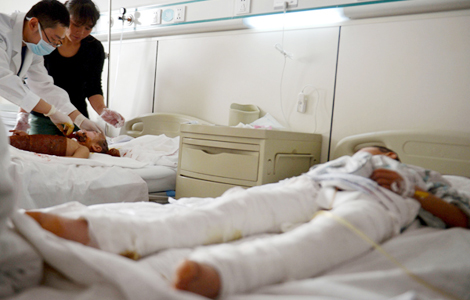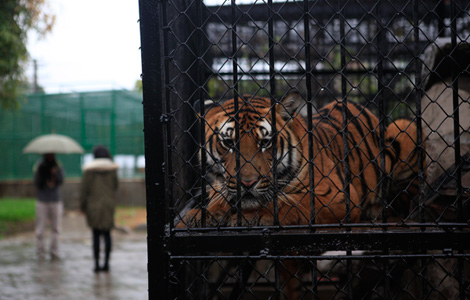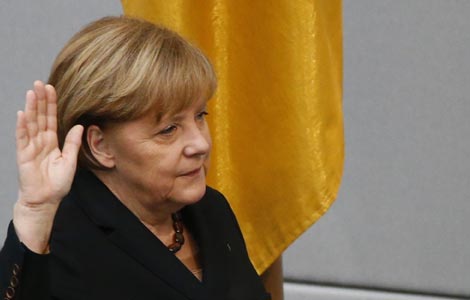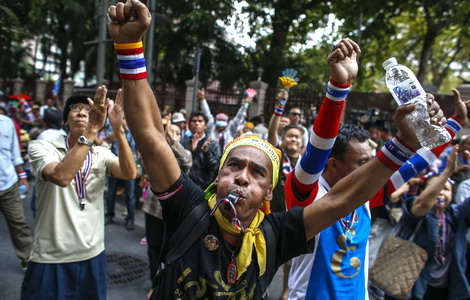Experts pour cold water on cloud seeding plans
Updated: 2013-12-19 01:00
By Zheng Xin (China Daily)
|
|||||||||
Plans have been unveiled to explore the use of weather manipulation techniques to reduce air pollution over Beijing, but experts have urged caution, citing the risks of secondary pollution.
Officials in the Chinese capital are aiming to adapt feasible meteorological interventions — including the creation of artificial rain by means of cloud seeding — to cut down on air pollution, according to a Xinhua News Agency report.
Lin Keqing, deputy mayor of Beijing, was quoted as saying on Tuesday that the city is seeking to conduct scientific experiments on the use of weather manipulation to beat pollution. He made the remarks during a conference on the modernization of meteorology but did not elaborate on the plans.
According to Guo Xueliang, who works for the weather modification center of the China Meteorological Administration, the main measures under consideration include cloud seeding and the removal of smog by artificial means.
The decision came after a document released by the China Meteorological Administration last month, saying that all provincial-level meteorological bureaus should be capable of artificially reducing smog by 2015.
However, some weather experts are not positive about the proposals.
Feng Yongfeng, founder of the Beijing-based environmental NGO Green Beagle, said weather manipulation is not only against the laws of nature, but would result in secondary contamination of soil and water.
The creation of artificial rainfall involves releasing chemical substances such as silver iodide into the air to encourage the formation of rain drops — a process known as cloud seeding. However, these chemicals would then fall to earth, polluting soil and water, Feng said.
Such substances could cause dangerous heavy-metal pollution and would provide only temporary relief for air pollution problems, he said.
"It's like taking medicine. Despite the momentary curative effects, the side effects cannot be calculated, while posing threats to the purifying capacities of the soil and water.
"It's okay to blow away the smog through weather manipulation once or twice, but it's not acceptable as a long-term solution," he said.
The government should conduct careful studies before implementing such methods, he said, adding that the key lies in the reduction of emissions, economic transition and public participation, which will take decades.
A researcher with the Institute of Policy and Management of the Chinese Academy of Sciences, said on condition of anonymity that weather manipulation is still a very sensitive topic and that limited research has been conducted into it.
"Unless it's necessary, it's better not to interfere with or disturb the weather, and it's possible we might become dependent on these chemical fixes and resort to them whenever the pollution worsens," he said.
Wu Zhenghua, a retired researcher from the Beijing Meteorological Bureau, said such pollution clearance measures were feasible as small-scale scientific experiments, and might have short-term effects.
But the government should also take into consideration the considerable costs in terms of equipment and the risks of secondary pollution, Wu said.
Apart from attempts at weather manipulation, Beijing will enhance the monitoring and forecasting of the meteorological environment, Lin, the deputy mayor, was quoted as saying.
Beijing plans to set up more than 200 new automatic meteorological observation stations by 2015, according to earlier media reports.
Wu Wencong contributed to this story.
zhengxin@chinadaily.com.cn
- Draft law seeks to tackle lethal European air
- 'High-beam' policies please
- Tianjin to curb car ownership in anti-smog drive
- China's chance to set a green global example
- China, Japan, ROK urge joint smog treatment
- Green buses to hit Beijing roads by 2017
- Study shows air pollution more deadly than thought

 Parents urged to supervise children's TV-viewing habits
Parents urged to supervise children's TV-viewing habits
 Jazzing up Beijing
Jazzing up Beijing
 Snow storm wallops NE USA
Snow storm wallops NE USA Russia to bail out Ukraine for $15 billion
Russia to bail out Ukraine for $15 billion
 Fatal tiger attack 'points to flaws in zoo management'
Fatal tiger attack 'points to flaws in zoo management'
 Merkel sworn in as chancellor for a third term
Merkel sworn in as chancellor for a third term
 Life in poetry
Life in poetry
 US first lady visits children in medical center
US first lady visits children in medical center
Most Viewed
Editor's Picks

|

|

|

|

|

|
Today's Top News
Military plays down 'near-miss' between warships
Fed to cut bond purchases by $10B
Overseas investing sees large jump
China expands research in Antarctica
Cloud seeding plans spark debate
Russia to bail out Ukraine for $15 billion
Vast deposits of 'flammable ice' found
System for organ donors test
US Weekly

|

|








